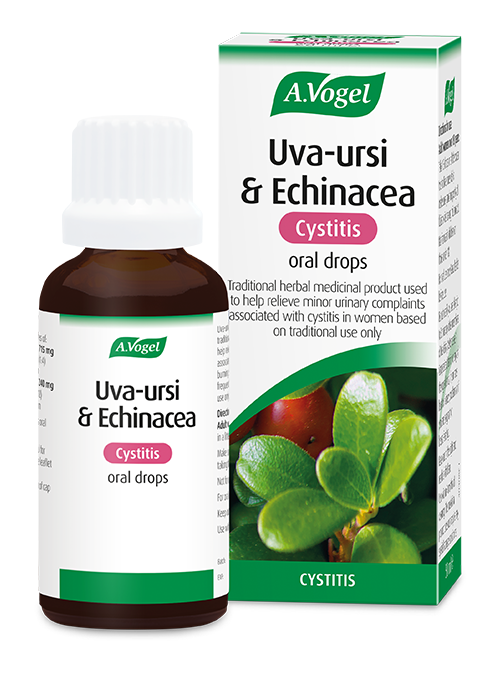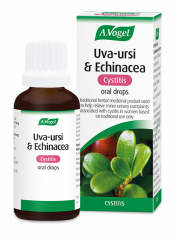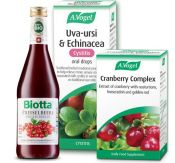Cystitis and IBS – what’s the link?
Up to 1/3 of people with interstitial cystitis are thought to struggle with the symptoms of IBS too. The causes of interstitial cystitis (also known as Painful Bladder Syndrome) aren’t well understood; whilst there appears to be no infectious cause with this type of cystitis, stress, inflammation or structural changes in the muscles, nerves or receptors in and around the urinary tract could potentially have a part to play.
Although it’s unlikely that IBS directly causes interstitial cystitis, these conditions may share some common contributing factors. This means by targeting these we may also be able to manage some of the shared symptoms.

Read on as I cover some of these common factors or symptoms that could be linking the two conditions and what could be done to help:
1. Antibiotic use
Although not so much for IBS, antibiotics are commonly prescribed in order to treat the symptoms of cystitis. Whilst antibiotics are intended to target the bad bacteria which are causing the underlying infection in the first place, unfortunately, they can also upset the balance of good bacteria whilst they’re at it. As you risk diminishing your proportions of good bacteria, bad bacteria are more likely to thrive and this can easily turn into a vicious cycle of recurrent infections and an ever-increasing reliance on antibiotics.
What can be done to help?
Next time you suspect you need a course of antibiotics to get your symptoms under control, why not consider if there is anything you could try from home first – read my blog on this topic for more advice. Of course, if your symptoms persist, get any worse or if you’re unsure, seeking advice from your doctor is the best approach.
At the first sign of infection, try taking a course of Uva-ursi & Echinacea drops. This is a licensed herbal remedy for the symptomatic relief of cystitis.
Uva-ursi & Echinacea Cystitis Oral Drops. Cystitis Treatment for Women
£12.99 (50ml) Get it tomorrow, 5th July.
Another tip, if antibiotics are deemed necessary, is to always ensure you take a course of probiotics alongside your course of antibiotics. This way you can help to protect your good bacteria, whilst still taking care of the bad.
2. Stress
Stress is thought to have convincing links with both interstitial cystitis and IBS, and may be a key player in the aetiology of these conditions. But what processes may be involved?
As interstitial cystitis, unlike traditional cystitis, isn’t thought to be caused by an infection, the nervous system may have a part to play instead. As the flare-ups can be random and irregular, are often persistent and are often hard to manage with conventional treatments, stress is commonly assumed to have a part to play.
When it comes to IBS, we’re gradually learning more about the connection between the gut and the mind, the technical term being the ‘gut-brain axis’. The two are most definitely linked via an intricate network of nerves which means that the gut may have an impact in mood-related disorders and vice versa.
Therefore, we suppose that low mood, stress or anxiety could be having an impact on conditions such as IBS and the symptoms we associate with it.
What can be done to help? 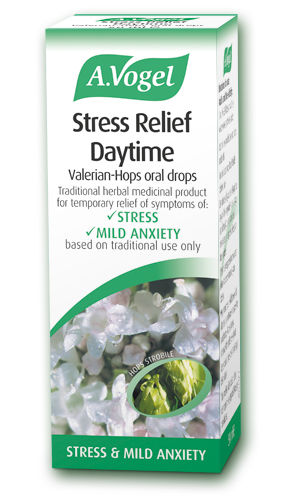
If you suspect that stress could be a common denominator when it comes to your digestive and urinary tract symptoms, there are things that can be done to help.
Stress management techniques are gradually becoming more widely accepted and even quite trendy – more people seem to be prepared to take their mental health more seriously and are giving them a go, which is just fantastic. Breathing techniques, mindful stretching, meditation and talking therapies are just a few of the options available which may have a positive impact when it comes to the symptoms of IBS or cystitis.
Coupling these practical habits with a remedy can also prove to be a useful tactic. Take the herbal tincture Stress Relief Daytime up to 3 times daily to help get stressful reactions under control.
3. Diarrhoea
Although IBS can present itself in different ways, IBS-D, meaning your symptoms are characterised by diarrhoea, is thought to affect up to 1/3 of total sufferers. Although, again, the exact causes of diarrhoea-associated IBS aren’t well understood, there are a few possible mechanisms.
Firstly, faulty nerve pathways connecting to the gut may have something to do with the onset of diarrhoea, as gut contractions are found to become more erratic whilst this symptom is dominant. Again, stress may also have something to do with this as a result of the gut-brain axis. As well as erratic nerve impulses contributing to more frequent bowel movements, they could also have some impact on the pain or discomfort experience in the case of interstitial cystitis, also known as Painful Bladder Syndrome (PBS).
Another possible mechanism for IBS-D is an imbalance in gut bacteria. We know that dysbiosis, or an alteration in gut bacteria may have something to do with the onset of symptoms, hence why prebiotics and probiotics can often be useful in the management of this condition. Interestingly, as bad bacteria are often at the root of the cause when it comes to traditional cystitis too, this as a potential cause is an important consideration. 
What can be done to help?
If diarrhoea is a frequent symptom for you, Silicol® Gel could help to make your life a little easier. Rich in silicic acid, Silicol® Gel helps to create a protective, soothing and healing barrier throughout the digestive tract whilst also adsorbing any imposing pathogens and excreting them from the body.
Worryingly, bad bacteria can migrate from the digestive tract into the urinary tract, so this might be just the remedy for you to help stop them in their tracks!
4. Constipation
If you fall into the IBS-D sub-type, or interestingly IBS-M (where there is alternating bouts of constipation and diarrhoea, meaning that constipation is also most likely to be at the root of the problem), then getting your bowel moving should be a priority.
Dehydration is one of the leading causes of constipation, and surprise, surprise, it can also be a common contributing factor when it comes to cystitis. See, a bunged up bowel won’t be encouraged to move if you’re all dried up and, unfortunately, concentrated urine is also the perfect breeding ground for bad bacteria within your bladder.
What can be done to help?
First and foremost – up your water intake. This is free, very effective and helps almost every system in your body – not only will your bowel and urinary tract benefit but everything from your skin to your cognitive functions could improve too!
Next, although lifestyle habits are often key here, if you feel you need a little helping hand to get your bowel moving initially, Linseed or Senna may be helpful for you.
5. Bloating
Bloating is one of the most common digestive complaints of all, as those with IBS will no doubt know only too well. So, if you suffer from bloating on a regular basis, what could be going on and how could this also be linked to the symptoms of cystitis?
Firstly, bloating very often goes hand in hand with constipation, so this is possibly something to address first. With a slow-moving gut, comes the inevitable fermentation of old poo (a natural process mediated by all the naturally-occurring bacteria which live there) and the result of this is gas; hence the nicely bloated tum you’re left with.
However, there’s also some research which connects interstitial cystitis and a state called small intestinal bacterial overdose (SIBO)1. SIBO involves a more pronounced imbalance of bacteria in the small intestine and it’s possible that this may also be having some sort of bearing in many cases. Now, although IC isn’t thought to be caused by an infection or imbalance in bacteria, it’s possible that inflammatory cells or a heightened sensitivity to pain could be a by-product of everything else going on.
What can be done to help? 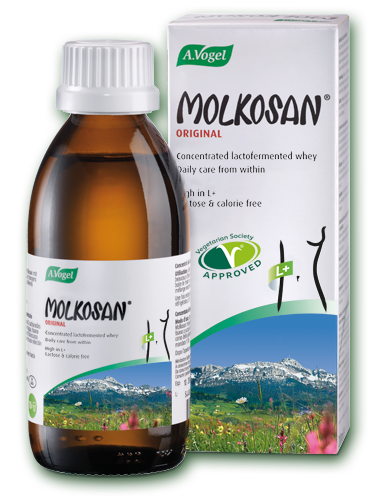
Although it isn’t well understood how exactly IC and SIBO are linked, managing the symptoms is thought to be the best approach until we know more.
Since we know that an imbalance of bacteria is apparent in cases of SIBO, this seems like a good place to start. My suggestion? Molkosan.
Molkosan is rich in L+ lactic acid and acts as a prebiotic. Prebiotics help to support the internal environment of the gut and, in doing this, they can help to correct the balance of bacteria in your gut. By supporting your good gut bacteria, we can help to keep any bad bacteria in check and help to protect against troublesome symptoms, including bloating.





